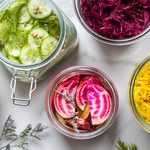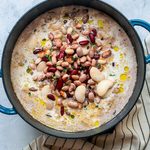Diet books, reviewed: The South Beach Diet Supercharged
We asked the experts to evaluate’and enhance’four popular diets. Here’s our assessment of diet book The South Beach Diet Supercharged
Source: Best Health Magazine, September 2008
 The South Beach Diet Supercharged
The South Beach Diet Supercharged
By Arthur Agatston, a Miami-based cardiologist (with Joseph Signorile)
Basic premise
Low-fat dairy products, high-fibre carbohydrates, lean protein and good unsaturated fats, such as those found in olive oil and flaxseeds, help keep your blood sugar levels on an even keel and prevent overeating.
What’s different
This version updates the original 2003 book with a 10-week exercise program, stretching how-tos, new recipes and meal plans, as well as an expanded food list.
The pros
- ‘This is the way we’re supposed to eat!’ says Melanie Rozwadowski, a registered dietitian and assistant professor of nutrition and dietetics at the University of Saskatchewan in Saskatoon. ‘The science is well-founded and the book is practical and easy to read, and supports healthy lifestyle changes. I love that the first half of the book deals with exercise.’
- ‘There is a lot of up-to-date, evidence-based information about weight gain. For example, lack of sleep can be an issue,’ says Rozwadowski.
The cons
- Agatston raises some concerns about the low fibre, vitamin and mineral content of today’s produce, compared to the heirloom varieties of the past, says Rozwadowski. ‘I don’t want people to stop eating broccoli because they think it’s not worth it.’
- The two-week Phase One of the program, intended for people with food cravings or who have more than 10 pounds to lose, may be too restrictive for some’no alcohol, bread, cereal, rice or fruit. ‘If you’re feeling sluggish or getting headaches, make sure you’re including good protein and lots of fibre at every meal, and eat until you’re satisfied’people often think that a diet means cutting way back,’ she says. ‘Go for a walk, get some fresh air and have a snack of a few nuts or a slice of cheese before cravings set in.’
Latest finds
A small 2007 University of Maryland study had people complete four weeks each of the Atkins, South Beach and Ornish programs, interspersed with four weeks of their regular eating habits. (Ornish refers to a very low-fat vegetarian plan created in 1990 by Dr. Dean Ornish, a professor of medicine at the University of California, San Francisco.) The results: Unhealthy LDL cholesterol levels went down by 10 to 23 percent for the South Beach and Ornish diets, and up 17 percent for Atkins.
Healthy boosts
- ‘The book recommends that you take daily 1,000- to 2,000-milligram supplements of fish oil [EPA and DHA] if you don’t eat fish twice a week,’ says Rozwadowski. ‘That’s in the upper range. If you don’t have a diagnosed heart condition, a 300- to 1,000-milligram supplement is appropriate for most women. Check with your doctor.’
- Some foods on the South Beach ‘to avoid’ list, such as potatoes, watermelon and pineapple, can be added back into your meals once you’re at a healthy weight and have gotten into the habit of making good food choices.
- Read our reviews of other diet books: The Best Life Diet, The All-New Atkins Advantage and The G.I. Diet Clinic.
Don’t miss out! Sign up for our free weekly newsletters and get nutritious recipes, healthy weight-loss tips, easy ways to stay in shape and all the health news you need, delivered straight to your inbox.




